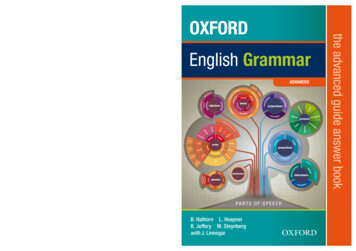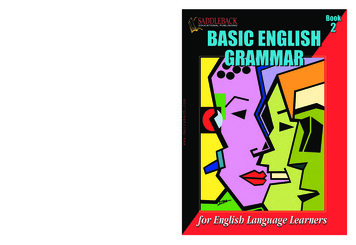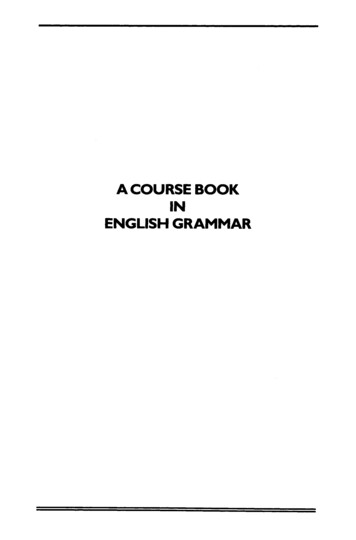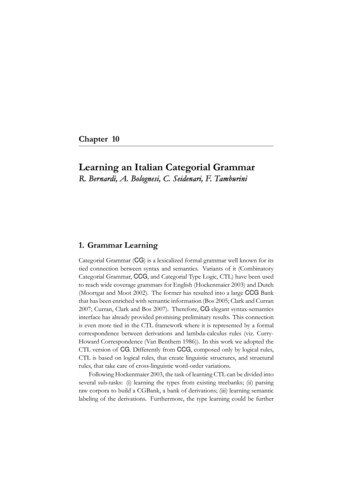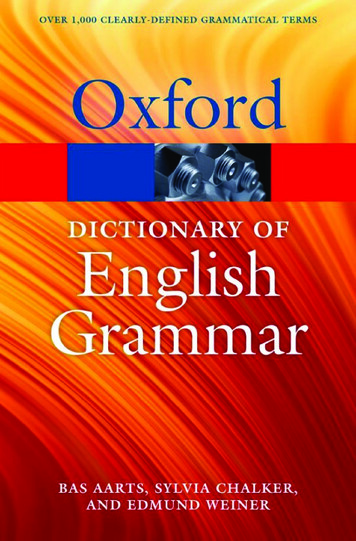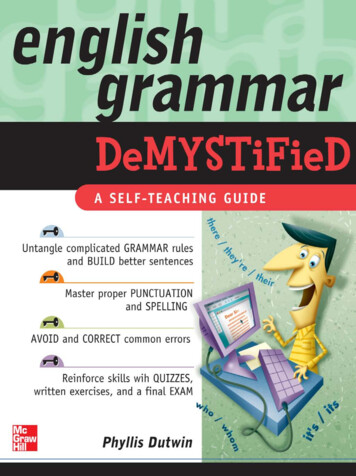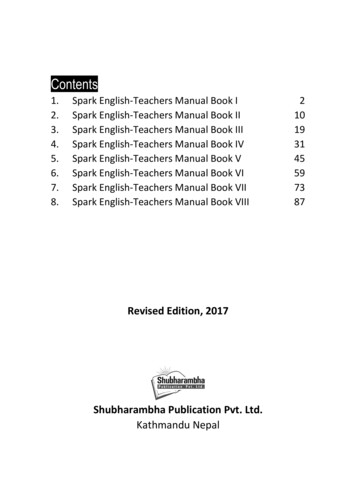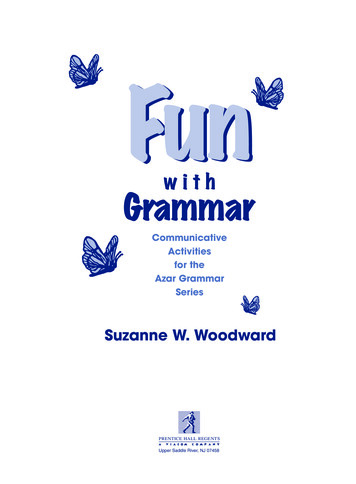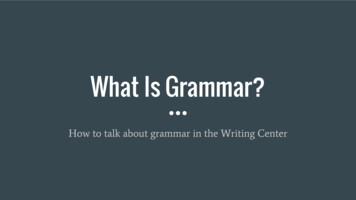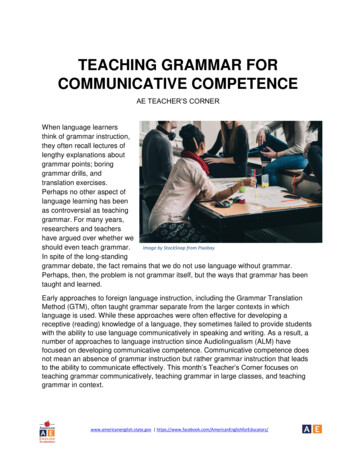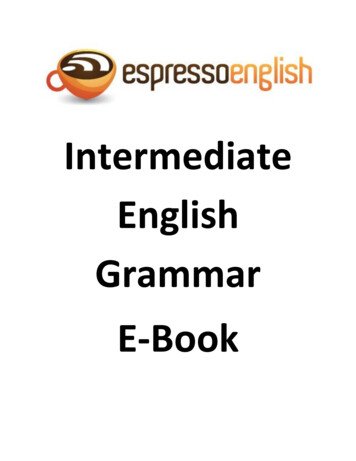
Transcription
IntermediateEnglishGrammarE-Book
2 Table of ContentsPresent Continuous For Future UseWill or Going To?Linking Words: Reasons and ResultsLinking Words: Adding, Organizing, SummarizingLinking Words: Contrasting IdeasTips for Learning Irregular VerbsSimple Past and Past ContinuousPresent Perfect Ever / NeverPresent Perfect Yet / Already / JustPresent Perfect For / SincePresent Perfect Simple / ContinuousComparative Adjectives: Not as asComparative Adjectives: QuantifiersComparative or Superlative?So / Neither / TooVerbs Infinitive or –INGPermission, Obligation, ProhibitionPrepositions of TimePrepositions of PlacePrepositions of MovementRelative ClausesWord Order: Asking Questionswww.espressoenglish.net
3 Direct and Indirect QuestionsTwo Forms of “Used to”Too and EnoughSome / Any / NoSubject-Verb AgreementFirst ConditionalSecond ConditionalShould / Could / WouldPast PerfectPresent Perfect or Past Perfect?Passive Voice: Present / PastReported Speech: StatementsReported Speech: Requests, Orders, Questionswww.espressoenglish.net
4 Welcome!Thanks for downloading the Intermediate English Grammar e-Book – I hopeit helps you with your English studies! If you have any questions about thelessons, please e-mail me at help@espressoenglish.netYou can also visit the Espresso English website, which has over 500 fun, fastonline English lessons (www.espressoenglish.net).Shayna OliveiraEspressoEnglish.netwww.espressoenglish.net
5 Present Continuous For Future UseTalking about the future in EnglishMany students use only will or going to inorder to talk about the future. However, it’svery common to use the presentcontinuous to talk about the future, in the caseof arrangements that are planned: I’m having dinner with friends tonight. She’s meeting David at the train stationtomorrow.-He isn’t coming to the party.We aren’t seeing our family this weekend.?What are you doing on Saturday?Is Mary arriving at 7:00 or 8:00 tomorrow morning?You can use the present continuous for future plans with these words: tonight, tomorrow, this weekend next week/month/year this summer/fall/winter/spring on Monday/Tuesday/Wednesday/etc. next et
6 Will or Going To?There are two additional ways to talk about the future in English:will/won’t and going to.Use “going to” for plans and arrangements: On my next vacation, I’m going to stay in a nice hotel in Paris.She’s going to look for a new job after her current contract ends.David’s going to meet me at the airport at 8:00.We’re going to get married next July.They’re going to visit Amy next week. They made plans to meet upon Monday.Peter and Paul are going to share an apartment when they move toNew York.Note: You can also use the present continuous for the future in these cases. On my next vacation, I’m staying at a nice hotel in Paris.David’s meeting me at the airport at 8:00.We’re getting married next July.Use “will/won’t” for promises: I‘ll send you an e-mail.I won’t tell anyone your secret.He‘ll pay you back tomorrow.We won’t forget your birthday.Use “will” for offers: I‘ll buy you a drink.My secretary will help you with the paperwork.Use “will” for decisions made in that moment: “Would you like potatoes or rice?”“I‘ll have the rice.””Which shirt do you like?”“Well, the red one is cheaper, but I prefer the color blue. I‘ll take theblue one.”www.espressoenglish.net
7 You can use either “will/won’t” or “going to” for predictions or generalstatements about the future: My company‘s going to move its headquarters overseas next year.My company will move its headquarters overseas next year. Your wife will love those flowers – they’re beautiful!Your wife’s going to love those flowers – they’re beautiful! The economy isn’t going to improve much this year.The economy won’t improve much this year. He won’t pass the test. He hasn’t studied at all.He’s not going to pass the test. He hasn’t studied at all.Use I think will and I don’t think will to express thoughtsabout the future.Don’t use I think won’t. (it doesn’t sound natural). I think you won’t like this movie. It’s very violent. I don’t think you’ll like this movie. It’s very violent.Will/Won’t vs. Going to QuizClick here to take the -willwont-vs-going-to#quizwww.espressoenglish.net
8 Linking Words: Reasons and ResultsImage source: FreeDigitalPhotos.netLinking words help you connect the ideas in asentence. In this lesson, you’ll learn somecommon linking words toexpress reasons and results.Linking Words: ReasonsBecause / Because ofThe difference between these two words is that because is followed bya subject verb, and because of is followed by a noun: The game was canceled because of the rain. The game was canceled because it was raining.In spoken English, many people say ’cause as a short form of “because.”Due to / Owing toDue to and owing to are also followed by a noun. These words are a littlemore formal.There’s a lot of traffic today due to the upcoming holiday.(holiday noun)The after-school program was canceled owing to lack of interest fromthe students.(lack noun)www.espressoenglish.net
9 Due to the fact that / Owing to the fact thatUse these phrases before a subject verb. Again, these phrases are a littlemore formal.Many people are still unemployed due to the fact that the economicrecovery has been slower than anticipated.The publisher rejected the author’s latest work owing to the fact thatthe manuscript was full of errors.Since / AsSince and as are more informal, and they are followed by a subject verb. I’m going to bed at 10 PM since I need to get up early tomorrow. I didn’t go to the gym today, as I had a lot of homework to do.Linking Words: ResultsTherefore / Consequently / As a resultThese words are more formal, and are more commonly used in writtenEnglish.Our company’s profits have increased 150% in the pastyear. Therefore, we’re going to invest in new equipment and trainingprograms.The tennis player had knee surgery mid-October; consequently, shetook the rest of the season off.There have been heavy rains throughout the interior of the state. As aresult, several areas have experienced flooding.So“So” is more informal, and more commonly used in spoken English.www.espressoenglish.net
10 We were hungry, so we stopped at a cafe for a snack.Linking Words Quiz: Reasons and ResultsClick here to take the lish.net
11 Linking Words: Adding, Organizing,SummarizingAdding Information and Examplesfor example / for instanceUse these words to give one example of the idea you are talking about. Bothof these expressions can go at the beginning or the end of a sentence.There are a number of problems in this school. For example, many ofthe classrooms don’t have audiovisual equipment.She has a lot of good ideas for our business – opening an onlinestore, for instance.Written English: i.e. and e.gIn written English, we can use i.e. to give further explanation orclarification; it means “that is” or “in other words.” Our last marketing campaign failed (i.e. we spent 50,000and didn’t make many sales).We can use e.g. to give examples; it means “for example” I enjoy radical sports (e.g. rock climbing, hang gliding, andwindsurfing).In formal writing, these expressions always appear insideparentheses.namely / such asThere is a difference between namely and such as.www.espressoenglish.net
12 Namely is followed by ALL of the examples you referred to, but suchas gives only one or some of the examples, not all of them.A few of the students – namely Brian, Thomas, and Jack – failed the course.A few of the students, such as Brian, failed the course.also / tooAlso can go in the middle of a sentence, whereas too is typically used at theend.We did a lot of sightseeing on our vacation. We also bought a number ofsouvenirs.We did a lot of sightseeing on our vacation. We bought a number ofsouvenirs, too.as well / as well asAs well goes at the end of the sentence (similarly to too).As well as must be followed by another word. She’s not only extremely successful, she’s beautiful as well. She’s beautiful as well as being extremely successful.in addition / moreover / furthermoreThese linking words are usually used at the beginning of a sentence to addanother idea or further develop the previous point.People who exercise regularly have more energy during the day andsleep better at night. In addition, they tend to live longer.Construction on the new subway has been delayed for months due tobudget shortfalls. Moreover, the workers are threatening to go onstrike.www.espressoenglish.net
13 Our sales are expected to rise 30% in the nextyear. Furthermore, purchase of new equipment will help cutmanufacturing costs and increase profits.Note: In addition, moreover, and furthermore are more formalEnglish. In informal spoken English, we usually use the expressionsplus, what’s more, and besides.Organizing and Ordering InformationFirstly / SecondlyWhen you are going to make a series of points, you canuse firstly and secondly for the first and second points. After that, you canuse “The third point,” ”The fourth point,” etc. or “in addition.”Lastly / FinallyFor your final point, you can begin the sentence with lastly or finally. Thesewords show your audience that you are almost finished.the former / the latterYou can use these words to refer back to two examples previouslymentioned:Our company has two factories: one in Detroit and one in Atlanta. Theformer is operating at 95% capacity and the latter at 65%.In this case, “the former” the factory in Detroit, and “the latter” thefactory in Atlanta.Summarizing Informationwww.espressoenglish.net
14 Here are some English phrases you can use to give a summary of theinformation you have already said or written. In general, these phrases go atthe beginning of the sentence and are followed by a comma. In short, In summary, To summarize, In conclusion, In a nutshell,(more informal)www.espressoenglish.net
15 Linking Words: Contrasting IdeasImage source: FreeDigitalPhotos.netBut / HoweverBut is more informal than however. You canuse however at the beginning of a sentence, but you can’tuse but at the beginning of a sentence (in written English). I tried to lift the box, but it was too heavy for me. I tried to lift the box. However, it was too heavy for me.Although / Even thoughThese linking words are the same, and they are both followed by a subject verb. Although I exercise every day, I can’t seem to lose any weight. She still loves him, even though he treated her very badly.Despite / In spite ofThese linking words are the same, and they are followed by a noun ora gerund (-ing form of the verb, which can function as a noun). Our plane arrived on time in spite of the delay during takeoff. We won the game despite having two fewer players.Despite the fact that / in spite of the fact thatThese phrases are followed by a subject verb. They arrived on time in spite of the fact that they left an hour late. We won the game despite the fact that we had two fewer players.While / Whereas / Unlikewww.espressoenglish.net
16 These linking words are used to make contrasts. While and whereas areusually used between two complete phrases. Unlike is typically used withonly a subject. I like tennis, while my brother prefers bowling. This cell phone plan costs 0.05 per minute, whereas that one givesyou up to 800 minutes per month for a fixed price. His boss allows him to work from home, unlike mine. She’s very friendly, unlike her sister.Linking Words Quiz: Contrasting IdeasClick here to take the contrastingideas#quizwww.espressoenglish.net
17 Tips for Learning Irregular VerbsDid you know that about 70% of the time when we use a verb in English, itis an irregular one? That means that learning and using irregular verbs isessential for learning English!The English language has so many irregular verbs that it can make you gocrazy but even irregular verbs follow some patterns. In this lesson,you’ll learn “groups” of irregular verbs that can make it easier to memorizethem.Don’t just study this list – try to create your own sentences and use all theverbs you know! This will help you remember them much better.Ready? Let’s go!Verbs with all 3 forms identicalLet’s begin with the easiest group of irregular verbs. These verbs are thesame in the present, the past, and the past participle. They include:bet, burst, cast, cost, cut, fit,* hit, hurt, let, put, quit, set, shut, split,spread* When talking about clothes being the correct sizeVerbs with identical Present and Past ParticipleThese verbs are the same in the present and the past participle. Only thesimple past form is different:PresentPastPast ww.espressoenglish.net
18 Verbs with –N in the Past ParticipleThese verbs are a little more complicated, as they have –n in the pastparticiple form. There are a few different groups of verbs:With “o” in the past and past participlePresentPastPast wearworewornPresentPastPast senwritewrotewrittenWith “o” in the past onlyPast with -ew, past participle with -ownPresentPastwww.espressoenglish.netPast Participle
19 nthrowthrewthrownOther irregular verbs with past participle ending in –nPresentPastPast oktakenVerbs with vowel changesLong “e” changes to short “e”PresentPastPast nglish.net
20 edled“ea” is pronounced differentlyPresentPastPast meantreadreadreadhearheardheardPresentPastPast roundwindwoundwoundPresentPastPast ParticipledigdugdugstickstuckstuckLong “i” changes to “ou”Short “i” changes to “u”www.espressoenglish.net
21 astPast ParticiplesellsoldsoldtelltoldtoldPresentPastPast aughttaughtthinkthoughtthought-ell changes to -old-ought and –aught endingsVerbs with 3 different vowels!Are you ready for a challenge? These irregular verbs have different vowels ineach form. Fortunately, they do follow a pattern.Vowel changes from “i” to “a” to “u”PresentPastPast Participlebeginbeganbegunwww.espressoenglish.net
22 he REALLY Irregular VerbsWell, these are the completely irregular verbs – the ones that don’t fit intoany of the categories above! They are also some of the most commonly usedverbs in the English language, so make sure to memorize them in all theircrazy irregular forms!PresentPastPast Participlebewas / ww.espressoenglish.net
23 Simple Past and Past ContinuousWhen to use the Past ContinuousTo talk about things that were in progress in the past.Past Continuous PositiveTo form the past continuous positive, usesubject was/were verb -ingI / He / She / ItwasstudyingYou / We / TheywerestudyingExamples: “What were you doing when I called you?”“I was studying.” She was playing guitar at the party. At 5:30 last night, we were driving home. They saw a starfish while they were walking on the beach.Past Continuous NegativeThe past continuous negative is:subject was not / were not verb -ingI / He / She / Itwas not(wasn’t)studyingYou / We / Theywere not(weren’t)studyingwww.espressoenglish.net
24 Examples: I wasn’t listening when the teacher gave the instructions. She wasn’t wearing jeans. She was wearing a dress. We weren’t driving very fast because the road was wet. They weren’t sleeping at 10 PM last night; they were watching amovie.Past Continuous QuestionsTo form past continuous questions, use:Was/Were subject verb -ingWasI / he / she / itsleeping?Wereyou / we / theysleeping?Examples: Were you sleeping when I called you? What was she thinking about last night? She looked worried. Was it raining when you left the bar? What music were they listening to?www.espressoenglish.net
25 Note: You can put a question word at the beginning: Who were you talking to on the phone last night?I was talking to my cousin. What was John doing at the library?He was looking for a book. Why were they drinking champagne yesterday?Because it was their anniversary.Be careful! Some verbs are never used in the continuous form:like, want, need, believe. I was needing to find a job.I needed to find a job.She was believing that he loved her.She believed that he loved her.Simple Past and Past ContinuousThe past continuous is often used together with the simple past to showthat one thing happened while another thing was in progress: I was talking on the phone when my sister arrived. He was drinking beer when he suddenly felt sick. She took a photo as we were getting out of the bus. We were waiting for the bus when we saw a car accident.www.espressoenglish.net
26 Simple Past and Past Continuous ExercisesClick here to take the d-pastcontinuous#quizwww.espressoenglish.net
27 Present Perfect Ever / Never“Have you ever taken dance classes?”Use the present perfect ever to ask questions about experiences insomeone’s life. “Have you ever taken dance classes?”“Yes, I have. I took 6 weeks of lessons before my wedding!” “Has your brother ever been to India?”“No, he hasn’t.” “Have your friends ever helped you move to a new apartment?”“Yes – twice!”Don’t use “ever” in the answer. Only use it in questions.If you want, you can use before in the answer: Yes, I’ve ever taken dance classes. Yes, I’ve taken dance classes before.(or simply “Yes, I have.”)Use the present perfect never to talk about things you have NOT doneat any time in your life. I’ve never failed a test. I’ve always gotten 80% or more.He’s never heard of Michael Jackson. I can’t believe he doesn’t knowthe King of Pop!www.espressoenglish.net
28 Samantha has never been surfing. She’s afraid of the ocean.We’ve never studied Italian. We studied French and Spanish in school,but Italian wasn’t available.They’ve never told a lie. I know we can trust them.Conversation Tip: Many conversations begin with a question in thepresent perfect, and then continue with more specific questions aboutthe experience in the simple past: “Have you ever taken dance classes?”“Yes, I have. I took 6 weeks of lessons before mywedding last year.”“Wow! So did you dance well on the big day?”“No, I didn’t – I forgot everything I’d learned in theclasses, and I stepped on my wife’s feet many times!”“Oh no! Was she angry?”“No – she said she still loved me!”Present Perfect Ever / Never QuizClick here to take the net
29 Present Perfect Yet / Already / JustThe words already, yet, recently, lately, and just all refer to a recent andnon-specific time. (A specific time would be “yesterday” or “three hoursago” or last Friday,” and in these cases we would use the simple past).Already and yetAlready can be used in positive statements and questions. “I’ve already read today’s newspaper.” “Have you already paid the electric bill?” “She’s finished the test already.”Note: Already can go in between “have/has” and the past participle (as inthe first two examples) or at the end of the sentence.Yet can be used in negative statements and questions. “We haven’t cleaned the house yet.” “Has he told you the good news yet?” “Have they booked their tickets yet?”Note: Yet usually goes at the end of the sentence or phrase.Recently, lately, and justRecently and lately can be used in positive statements, negative statements,or questions:Recently “He’s recently lost some weight.” “I haven’t seen her recently.” “Have you spoken to Beth recently?”Lately “I’ve gotten a lot of spam e-mails lately.” “Adam and Jessica haven’t been to church lately.” “Have you seen any good movies lately?”www.espressoenglish.net
30 Just (usually means very recent) is typically only used in positivestatements and questions: “Don’t touch the walls. I’ve just painted them; they’re still wet.” “What book have you just finished reading?”American EnglishSpoken American English often uses the simple past with already,yet, and just: “Did you book the tickets yet?”(instead of “Have you booked ”)“I already replied to the e-mail.”(instead of “I’ve already replied ”)“We just got back from the gym.”(instead of “We’ve just got ”)Quiz: Present Perfect with ever, never, already, recently, lately,and justClick here to take the ssoenglish.net
31 Present Perfect For / SinceThe present perfect is also used with for and since to talk about actionsthat began in the past and continue to the present. “I’ve lived here since 2004.” “I’ve lived here for 8 years.”Since is used with a point in time, and means “from that point in time untilthe present.” Use since with dates (2011, January, Tuesday, etc.), times(6:15, noon, this morning, etc.), and past events (I was a child, hegraduated from college, etc).Since is always used with the present perfect, and not the simple past: “I’ve gone to the beach every year since I was a child.”(repeated action that continues until today) “I went to the beach when I was a child.”(finished action at a specific time in the past;I don’t go to the beach nowadays)For is used with a time period, and means “for that period of time until thepresent.” Use for with times of any length (five seconds, eight hours, twodays, six weeks, nine months, ten years, a decade, centuries, etc.)Be careful with for, because using the present perfect or the simple past canchange the meaning: “We’ve lived in Berlin for 6 months.” (and we live in Berlin now) “We lived in Berlin for 6 months.” (and we don’t live in Berlin now)Quiz: Present perfect with FOR and SINCEClick here to take the spressoenglish.net
32 Present Perfect Simple / ContinuousHow to form the Present Perfect Continuous:Positive and Negative Statements:SUBJECTAUXILIARY VERBBEEN-ING FORMIhavebeenworking here since 1992.Hehasn’tbeensleeping well lately.Questions:QUESTION WORD AUXILIARY VERB SUBJECTBEEN-ING FORMHow longhaveyoubeenstudying English?How longhasshebeenplaying tennis?In some cases, either the present perfect simple or the present perfectcontinuous can be used, with the same meaning. We often do this with theverbs “work” and “live”: “I’ve worked here since 1992.” “I’ve been working here since 1992.”However, we often use the present perfect continuous to emphasizethe action, and the present perfect simple to emphasize the result: “I’ve been working on this report for three weeks.”(emphasizes the action of working) “I’ve finished the project.”(emphasizes that the project is done) “We’ve been cleaning the house all afternoon.”(emphasizes the action of cleaning)www.espressoenglish.net
33 “We’ve cleaned the bathroom and the kitchen.”(emphasizes the fact that the bathroom and kitchen are done)Remember that “state” verbs are never used in continuous form:“I’ve been knowing my best friend since elementary school.”“I’ve known my best friend since elementary school.”“She’s been understanding everything in the advanced class so far.”“She’s understood everything in the advanced class so far.”In spoken English, we often use the present perfect continuous totalk about ways you have spent your time recently: “Hi, Joanna! What have you been up to lately?”“I’ve been training for a karate competition.”“Wow – good luck! And how is your son?”“He’s good. He’s been studying a lot lately because finals arecoming up next week.”Quiz: Present Perfect Continuous / Present Perfect SimpleClick here to take the .espressoenglish.net
34 Comparative Adjectives:Not as as“The white wine is not as expensive as the red wine.”You know how to compare two things by using comparative adjectives:1.Add -ER (taller, older, faster)2.Add -ER and double the final consonant (bigger, hotter, thinner)3.Remove -Y and add -IER (easier, friendlier, prettier)4.5.Add “more” or “less” to long words (more expensive, less popular,more interesting)Irregular comparatives (better, farther, worse)There’s another structure that you can use:not as (adjective) as Running is not as fast as biking. Biking is faster than running. Canada is not as hot as Ecuador. Ecuador is hotter than Canada. Helen is not as friendly as her husband. Helen’s husband is friendlier than she is.www.espressoenglish.net
35 Movies are not as interesting as books. Books are more interesting than movies. Playing video games is not as good as exercising. Exercising is better than playing video gamesIn this structure, we don’t use -ER or “more” with the adjective. This shirt isn’t as prettier as that blouse.This shirt isn’t as pretty as that blouse. Last week’s test wasn’t as worse as the previous one.Last week’s test wasn’t as bad as the previous one.Comparative Adjectives Exercise: NOT AS ASClick here to take the jectives-not-as-as#quizwww.espressoenglish.net
36 Comparative Adjectives: Quantifiers“The dog is SLIGHTLY bigger than the cat.The elephant is MUCH bigger than the cat.”Comparative adjectives are used to compare two things.Quantifiers show if the difference is big or small.Quantifiers showing a big differenceQuantifiers showing a small differencea lot(informal)a littlea great deala ya shade / a hair / a tad(informal)considerablyway(informal)These quantifiers can be used both to show a “more” difference and a “less”difference: This car is a bit more expensive than this motorcycle.www.espressoenglish.net
37 This motorcycle is a bit less expensive than this car. This house is way bigger than that apartment. That apartment is way smaller than this house.These quantifiers CANNOT be used with the not as as structure: My brother is much not as old as me.My brother is much younger than me. Jill is a little not as tall as Kim.Jill is a little shorter than Kim.www.espressoenglish.net
38 Comparative or Superlative?Comparative: To compare 2 things. The boy is taller than the girl. The girl is shorter than the boy. The boy is older than the girl. The girl has longer hair than the boy.Superlative: To compare 3 or more things. The brush on the left is the biggest. The brush on the right is the smallest.Quiz: Comparative or Superlative?Click here to take the -superlative#quizwww.espressoenglish.net
39 So / Neither / Too“I love strawberry ice cream.” – “Me too!”Me Too / Me NeitherThe easiest way to agree in English is to say ”Me too” (to agree with apositive statement) or “Me neither” (to agree with a negative statement):“I love strawberry ice cream.”“Me too!”“I don’t go to the gym very often.”“Me neither.”A “negative statement” is any sentence that uses a negativeauxiliary verb: don’t / doesn’t / didn’tcan’thaven’t / hasn’t / hadn’twon’t / wouldn’tisn’t / aren’t / am notneverYou can say “Me too” or “Me neither” in response to statements in any tense(present, past, future, present continuous, present perfect, past perfect,etc.)www.espressoenglish.net
40 Examples:“I’ve been traveling a lot for work lately.”“Me too.”“I haven’t seen the new movie yet.”“Me neither.”“I’m going to the beach tomorrow.”“Me too!”“I can’t draw very well.”“Me neither.”The phrase “me either” is not technically correct, but many peoplesay it in spoken English!So do I / Neither do IYou can say “So do I” and “Neither do I” to respond to simple presentsentences.“I always sleep late on Saturday.”“So do I.”“I don’t think that’s a good idea.”“Neither do I.”So am I / Neither am IYou can say “So am I” and “Neither am I” torespond to simple present sentences withthe verb “BE” or present continuoussentences.“I’m from Moscow.”“So am I!”www.espressoenglish.net
41 “I’m not very outgoing.”“Neither am I.”“I’m studying for the test next week.”“So am I.”So did I / Neither did IYou can say “So did I” and “Neither didI” to respond to simple past sentences.“I studied chemistry in college.”“So did I.”“I didn’t like broccoli when I was a kid.”“Neither did I.”So was I / Neither was IYou can say “So was I” and “Neither was I” to respond to simple pastsentences with the verb BE or past continuoussentences.“I was very athletic when I was in high school.”“So was I.”“I wasn’t happy about the new company policy.”“Neither was I.”So have I / Neither have IYou can say “So have I” and “Neither have I” to respond to presentperfect sentences and present perfect continuous sentences.“I’ve been married for over 20 years.”“So have I.”www.espressoenglish.net
42 “I haven’t had much free time this week.”“Neither have I.”“I’ve been thinking about learning a new l
Thanks for downloading the Intermediate English Grammar e-Book – I hope it helps you with your English studies! If you have any questions about the lessons, please e-mail me at help@espressoenglish.net You can also visit the Espresso English website, which has over 500 fun, fast online English
